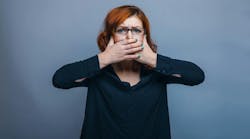How to make patients with OCD feel comfortable in the dental chair
What is OCD?
Obsessive-compulsive disorder (OCD) is not rare; it affects approximately 8.2 million adults and roughly one in 100 children nationwide.1 There is a common misconception that being particular or perfectionistic about things makes people "a little OCD," but this disorder is potentially debilitating condition that can severely impact the lives of those affected by it.2
The National OCD Foundation defines obsessions as "unwanted, intrusive thoughts, images, or urges that trigger intensely distressing feelings" and compulsions as "behaviors an individual engages in to attempt to get rid of the obsessions and/or decrease distress tendencies." These compulsions manifest in a myriad of ways, including the adoption of personal rituals, routines, hyper-fixations, and anxiety.2
Since fears about cleanliness and hygiene are common in people with OCD, this may translate into a form of dental anxiety when it's time for a regular cleaning.
OCD and dental anxiety
Although not everyone with OCD is anxious about seeing their dentist, the National Institute of Mental Health (NIMH) notes that of the four main types of obsessive symptoms involves the fear of infection, disease, and contamination. This may present a significant challenge for dentists and hygienists encountering obsessive-compulsive patients.3
There is a lack of extensive research on the relationship between OCD and dental anxiety, but a 2021 study found a direct correlation between germophobia and distrust in dental environments. Researchers found that patients with OCD may question the cleanliness of objects in the dental office such as the materials, tools, table, and the dental chair.3
Not only that, but OCD-related thoughts can lead to poor oral hygiene and dental complications. For example, one case report noted that a patient who developed a ritual of tapping on their teeth in a specific manner before carrying out daily activities led to noticeable wear in multiple teeth. Other case reports from the International Journal of Dentistry noted instances of patients refusing treatment, oral self-mutilation, prolonged toothbrushing, and dietary fears that led to poor oral health-including scurvy.3
Helping patients with OCD
A lack of awareness or education pertaining to OCD behaviors may hinder a dentist or hygienist's ability to provide services and patient satisfaction. Therefore, a complete medical history-including mental health-should be taken prior to treating a patient who may have OCD. Ultimately, the presence of obsessive-compulsive behaviors necessitates personal, tailored treatment approaches.3
But how can dental professionals assuage their worries?
Patients with OCD may need cleaning demonstrations; sometimes "showing" them how tools and surfaces are cleaned is more effective than simply telling them they've been sterilized. Cleaning in front of patients allows them to see with their own eyes that their environment is safe and free of germs.3 Explaining safety protocols, washing your hands, and putting on new gloves and a mask can ease patient anxieties as well.
Dentists may also need to work with the patient and their physician on medications. One patient mentioned in the International Journal of Dentistry report developed bruxism from a medication, which subsided when their medication was adjusted-and the aforementioned patient who developed scurvy was successfully treated with diet recommendations and vitamin supplements.3
Ultimately, treating a patient with OCD is an individualized process; it is not one-size-fits-all. Clinicians should take the time to truly understand each patient's needs, obsessions, and compulsions in order to provide the best comprehensive care.
References
-
Who gets OCD? International OCD Foundation. https://iocdf.org/about-ocd/who-gets-ocd/
-
What is OCD? International OCD Foundation. https://iocdf.org/about-ocd/
-
Elkamash HM, Abuohashish HM. The behavior of patients with obsessive-compulsive disorder in dental clinics. Int J Dent. 2021 Aug 30;2021:5561690. doi: 10.1155/2021/5561690
About the Author

Sarah Butkovic, MA, BA
Sarah Butkovic, MA, BA, is an Associate Editor at Endeavor Business Media, where she works on creating and editing engaging and informative content for today's leading online dentistry publications. She holds a Master's English Language and Literature from Loyola University Chicago and is passionate about producing high-quality content that educates, inspires, and connects with readers.

